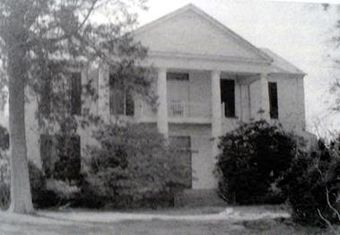Cedar Haven facts for kids
Quick facts for kids |
|
|
Cedar Haven
|
|

Front of the house
|
|
| Nearest city | Faunsdale, Alabama |
|---|---|
| Built | 1850 |
| Architectural style | Greek Revival |
| MPS | Plantation Houses of the Alabama Canebrake and Their Associated Outbuildings Multiple Property Submission |
| NRHP reference No. | 93000600 |
| Added to NRHP | July 13, 1993 |
Cedar Haven was a large, historic home built in the Greek Revival style. It was located near Faunsdale, in Alabama. This beautiful house was built in 1850.
Contents
What Was Cedar Haven?
Cedar Haven was a type of large home called a plantation house. These homes were often the center of big farms in the southern United States. They were built in a popular style called Greek Revival. This style was inspired by ancient Greek temples.
Who Built Cedar Haven?
The house was built in 1850 by a man named Phillip J. Weaver. He was a successful merchant and a planter, meaning he owned a large farm. Weaver was born in Pennsylvania in 1797. He later moved to Selma, Alabama, in 1818. In Selma, he ran a very successful store. He also had a home there.
Weaver was an important person in his community. When a nearby town, Woodville, needed a name for its new post office, the name Woodville was already taken. Weaver suggested the name Uniontown. This name is still used for the town today. Phillip J. Weaver passed away in Selma in 1865.
After Weaver's death, the plantation was owned by John Davidson Alexander. He was born in North Carolina in 1820 and lived until 1901. His son, Houston Alexander, later inherited Cedar Haven.
How Was the House Designed?
Cedar Haven was a grand house. It had a special entrance feature called a tetrastyle portico. This means it had a porch with four tall columns supporting the roof. These columns were in the Doric style, which is a simple and strong type of Greek column.
Why Was Cedar Haven Important?
Cedar Haven was recognized for its historical value. On July 13, 1993, it was added to the National Register of Historic Places. This is a list of places in the United States that are important to history. It was part of a larger group of historic homes called the Plantation Houses of the Alabama Canebrake and Their Associated Outbuildings Multiple Property Submission.
What Happened to Cedar Haven?
Sadly, by 1995, Cedar Haven was already in poor condition. It had fallen into disrepair. The historic house was eventually destroyed in the 2000s.
 | Janet Taylor Pickett |
 | Synthia Saint James |
 | Howardena Pindell |
 | Faith Ringgold |



